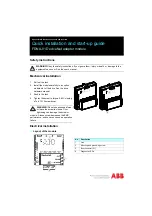
5-13
Chapter 5: BIOS
Parity
A parity bit can be sent with the data bits to detect some transmission errors.
Options include
None
(no parity bit), Even (parity bit is 0 if the number of 1’s in
the data bits is even), Odd (parity bit is 0 if the number of 1’s in the data bits is
odd), Mark (parity bit is always 1) or Space (parity bit is always 0. The Mark and
Space Parity do not allow for error detection.
Stop Bits
Stop bits indicate the end of a serial data packet (a start bit indicates the
beginning). The standard setting is
1
stop bit. Communications with slow devices
may require more than 1 stop bit. Options are
1
or 2.
Flow Control
Flow control can prevent data loss from buffer overflow. When sending data, if
the receiving buffers are full, a ‘stop’ signal can be sent to stop the data flow.
Once the buffers are empty, a ‘start’ signal can be sent to re-start the flow.
Hardware flow control uses two wires to send start/stop signals. Options include
None
and Hardware RTS/CTS.
VT-UTF8 Combo
Key Support
This setting
Enables
or Disables VT-UTF8 Combination Key support for ANSI/
VT100 terminals.
Recorder Mode
This setting Enables or
Disables
Recorder Mode. When enabled only text will be
sent. This is to capture Terminal data.
Resolution
100x31
This setting
Enables
or Disables extended terminal resolution.
Legacy OS
Redirection
Resolution
This allows you to set for legacy OSes the number of rows and columns
supported for redirection. Options include 80x24 or
80x25
.
Putty KeyPad
This setting allows you to select the funtion key and KeyPad to use on the Putty
keyboard. Options include
VT100
, LINUX, XTERMR6, SCO, ESCN or VT400.
COM2
Console Redirection
Use this setting to
Enable
or Disable Console Redirection for the COM2 port.
Console
Redirection Settings
This sub-menu contains Console Redirection settings for the COM2 port.
Terminal Type
This setting allows you to select the Terminal Type to use for Console
Redirection emulation. Options include ANSI (extended ASCII character set),
VT100 (ASCII character set),
VT100+
(extends VT100 to support color, function
keys, etc.) and VT-UTF8 (uses UTF8 encoding to map Unicode characters onto
one or more bytes).
Bits per Second
This setting selects the serial port transmission speed, which must be matched
on the other side. Long or noisy lines may require lower speeds. Options include
9600, 19200, 38400, 57600 and
115200
.
Data Bits
This sets the number of data bits as either 7 or
8
.
Parity
A parity bit can be sent with the data bits to detect some transmission errors.
Options include
None
(no parity bit), Even (parity bit is 0 if the number of 1’s in
the data bits is even), Odd (parity bit is 0 if the number of 1’s in the data bits is
odd), Mark (parity bit is always 1) or Space (parity bit is always 0. The Mark and
Space Parity do not allow for error detection.
Stop Bits
Stop bits indicate the end of a serial data packet (a start bit indicates the
beginning). The standard setting is
1
stop bit. Communications with slow devices
may require more than 1 stop bit. Options are
1
or 2.
Table 5-10. Serial Port Console Redirection Sub-menu (Continued)
Menu Option
Description
Summary of Contents for SBI-7147R-S4X
Page 1: ...SBI 7147R S4X Blade Module User s Manual Revison 1 0...
Page 4: ...SBI 7147R S4X Blade Module User s Manual iv Notes...
Page 8: ...SBI 7147R S4X Blade Module User s Manual viii Notes...
Page 30: ...SBI 7147R S4X Blade Module User s Manual 2 18 Notes...
Page 72: ...SBI 7147R S4X Blade Module User s Manual 5 20 Notes...
Page 82: ...SBI 7127R SH Blade Module User s Manual A 10 Notes...
Page 84: ...SBI 7147R S4X Blade Module User s Manual 0 2 SBI 7147R S4X...
















































